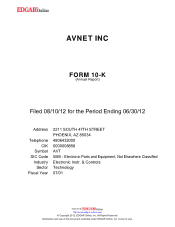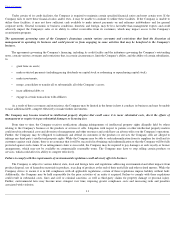Avnet 2012 Annual Report Download - page 9
Download and view the complete annual report
Please find page 9 of the 2012 Avnet annual report below. You can navigate through the pages in the report by either clicking on the pages listed below, or by using the keyword search tool below to find specific information within the annual report.
Table of Contents
An industry down
-
cycle in semiconductors could significantly affect the Company's operating results as a large portion of revenues come
from sales of semiconductors, which is a highly cyclical industry.
The semiconductor industry historically has experienced periodic fluctuations in product supply and demand, often associated with
changes in technology and manufacturing capacity, and is generally considered to be highly cyclical. During each of the last three fiscal years,
sales of semiconductors represented over 50% of the Company's consolidated sales, and the Company's revenues, particularly those of EM,
closely follow the strength or weakness of the semiconductor market. Future downturns in the technology industry, particularly in the
semiconductor sector, could negatively affect the Company's operating results and negatively impact the Company's ability to maintain its
current profitability levels.
Failure to maintain its relationships with key suppliers could adversely affect the Company’s sales.
One of the Company's competitive strengths is the breadth and quality of the suppliers whose products the Company distributes. However,
sales of products and services from one of the Company's suppliers, IBM, accounted for approximately 11% of the Company's consolidated sales
in fiscal year 2012. Management expects IBM products and services to continue to account for roughly a similar percentage of the Company's
consolidated sales in fiscal year 2013. The Company's contracts with its suppliers, including those with IBM, vary in duration and are generally
terminable by either party at will upon notice. To the extent IBM or other primary suppliers significantly reduce their volume of business with
the Company in the future, because of a product shortage, an unwillingness to do business with Avnet, or otherwise, the Company's business and
relationships with its customers could be materially and adversely affected because its customers depend on the Company's distribution of
electronic components and computer products from the industry's leading suppliers. In addition, to the extent that any of the Company's key
suppliers modify the terms of their contracts including, without limitation, the terms regarding price protection, rights of return, rebates or other
terms that protect or enhance the Company's gross margins, it could materially and adversely affect the Company's results of operations,
financial condition or liquidity.
Declines in the value of the Company's inventory or unexpected order cancellations by the Company's customers could materially and
adversely affect its business, results of operations, financial condition and liquidity.
The electronic components and computer products industries are subject to rapid technological change, new and enhanced products,
changes in customer needs and changes in industry standards, which can contribute to a decline in value or obsolescence of inventory.
Regardless of the general economic environment, it is possible that prices will decline due to a decrease in demand or an oversupply of products
and, as a result of the price declines, there may be greater risk of declines in inventory value. Although it is the policy of many of the Company's
suppliers to offer distributors like Avnet certain protections from the loss in value of inventory (such as price protection and limited rights of
return), the Company cannot be assured that such policies will fully compensate for the loss in value, or that the vendors will choose to, or be
able to, honor such agreements, some of which are not documented and, therefore, subject to the discretion of the vendor. In addition, the
Company's sales are typically made pursuant to individual purchase orders, and the Company generally does not have long-
term supply
arrangements with its customers. Generally, the Company's customers may cancel orders 30 days prior to shipment with minimal penalties. The
Company cannot be assured that unforeseen new product developments, declines in the value of the Company's inventory or unforeseen order
cancellations by its customers will not materially and adversely affect the Company's business, results of operations, financial condition or
liquidity.
Substantial defaults by the Company's customers on its accounts receivable or the loss of significant customers could have a significant
negative impact on the Company's business, results of operations, financial condition or liquidity.
A significant portion of the Company's working capital consists of accounts receivable from customers. If customers responsible for a
significant amount of accounts receivable were to become insolvent or otherwise unable to pay the amount it owes the Company, or were to
become unwilling or unable to make such payments in a timely manner, the Company's business, results of operations, financial condition or
liquidity could be adversely affected. An economic or industry downturn could adversely and materially affect the servicing of these accounts
receivable, which could result in longer payment cycles, increased collection costs and defaults in excess of management's expectations. A
significant deterioration in the Company's ability to collect on accounts receivable could also impact the cost or availability of financing under its
accounts receivable securitization program (see Financing Transactions appearing in Item 7 of this Report).
8






















